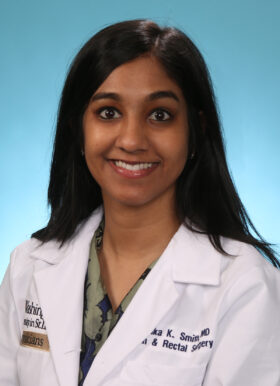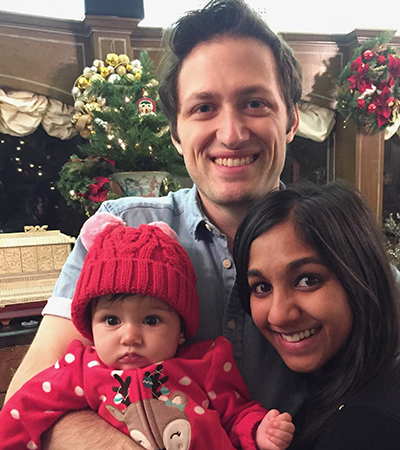Radhika Smith, MD

Radhika Smith, MD is a colorectal surgeon whose areas of specialty include diseases of the colon, rectum and anus.
Dr. Smith sees patients at:
- Barnes-Jewish West County Hospital, Medical Building One, 1040 N. Mason Road, Suite 120, Creve Coeur, MO 63141
- Center for Advanced Medicine – South County, 5201 Midamerica Plaza, Suite 2300, St. Louis, MO 63129
Please call 314-454-7177 for an appointment.
What happened in the course of schooling to influence you to choose your specialty?
It was the patients. I love taking care of colorectal surgery patients. They can have problems as serious as colon and rectal cancer, ulcerative colitis and Crohn’s disease that require intense surgery. And they can also have minor problems like hemorrhoids, fissures and other conditions that might not make them sick, but have a huge impact on their day-to-day life.
Being able to treat these patients and knowing it is possible to give them peace of mind and help improve their quality of life — is what made me fall in love with the field.
You graduated from the University of Missouri at Kansas City (UMKC) accelerated program. Did that mean right out of high school, you knew you wanted to be a doctor?
Yeah, absolutely. Out of high school, I went to the UMKC six-year combined medical MDBA program. Since I was a young child, I knew I wanted to be a physician and it seems crazy, but when I was 16 years old, I was ready to make that commitment. Going into that program was one of the best decisions I’ve ever made. I love the path is has taken me.
Did you also determine your specialty at an early age?
That instant and intense gratification is what drew me to surgery. Rotating throughout all the specialties, I found my calling in colorectal surgery because of the breadth of the cases. There is also a multidisciplinary approach to care that is emphasized here at Washington University. We work very closely with our radiation oncologists, medical oncologists, urogynecologists, and gastroenterologists. That collaborative approach to medicine guided me into the field of academic surgery.

Does the medical profession run in your family?
There are doctors in the family, but everyone has influenced me. My father is a cardiologist and my sister is a hospitalist — that exposure and experience played a part in how I got here. My mom is a philanthropist; she instilled and fostered the desire to care for people. I have one brother who is a teacher in Kansas City, another who does JAG for the Marines and another brother who is a public defender – they all have the devotion that we are here to help and serve others.
What brought you to Washington University?
What brought me to Washington University is a commitment to excellent patient care and the desire to be on the forefront of academic advancement. You can tell as soon as you walk into this hospital, these are all professionals who strive to be the top of their field. The opportunity to be part of such a great institution and collaborate with other departments will help me reach my full potential as a physician.
Which aspect of your practice is most interesting?
What was so appealing to me about colorectal surgery is every aspect of my practice is interesting. I love taking care of the variety of patients who come to see me every day – whether it is a new diagnosis of cancer, diverticulitis, hemorrhoids, Crohn’s disease, anal pain, fecal incontinence, ulcerative colitis, or chronic constipation. It is important to remember that every patient feels vulnerable, is going through something that affects his or her quality of life, and is looking to me for help. It really makes you love what you do and be excited by it every day.
What new developments in your field are you most excited about?
The new development in my field I am most excited about is the role of non-operative management for the treatment of rectal cancer. This is actually contrary to my specialty, because it means I don’t have a surgical role in the patient’s treatment, but it still allows me to manage patients with rectal cancer in a novel way we never thought possible.
Many colorectal surgeons here and in select centers across the country are recognizing that there is a small group of patients who will respond to chemotherapy and radiation in the management of rectal cancer. This non-operative treatment allows those patients to avoid the complications that sometimes are associated with surgery.
Previously, the diagnosis of rectal cancer meant surgery resulting in a permanent colostomy. But now, for certain patients, we don’t do surgery – and that is really exciting. Our number one goal is to cure the patient – the safest and easiest way possible.
Where are you from?
My parents came here from India. I was born in New Jersey and grew up in Florida. I did my training in Philadelphia and went back to Florida for my colorectal surgery fellowship. I spent two years in practice in Chicago – and when my husband and I both finished training, we wanted to relocate to an academic center. Washington University was the perfect fit for the two of us.
What is the best advice you have received?
This seems trite and obvious but the best advice I’ve received is treat patients the way you want to be treated and the way you would want a member of your family to be treated.
I’ve had experiences with chronically ill relatives where I’ve felt the doctor was not approachable or accessible. In my practice I strive to make sure my patients know they can always get in touch with me – through our offices and through our residents. Everyone on our healthcare team will work together to answer questions the best they can.
If you weren’t a doctor, what would you like to be doing?
I think a cool and creative job would be an editor of a magazine or a journalist. Another great job would be in politics or healthcare reform. Not a politician, but on the managerial side, like running a campaign or doing PR – that would be exciting.